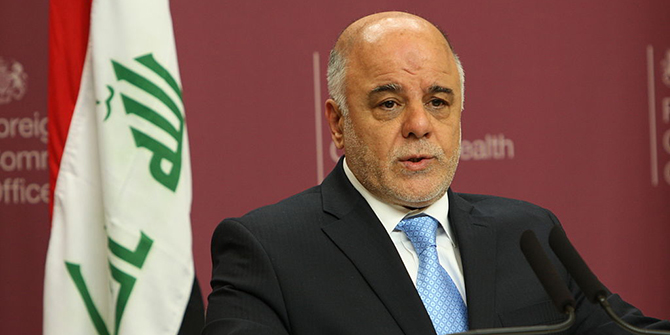by Phyllis Starkey On Thursday 29 May 2014, the LSE Middle East Centre and the European Council on Foreign Relations co-hosted a conference looking at Europe’s role in the Israel-Palestine relations after the Kerry effort. Bringing together a group of academics, policy makers and experts, the conference tackled, among others, the following questions: What are the options, and what is the contribution Europe can make? What are the choices behind which all EU member states can rally? Are the ‘pre-Kerry’ policy positions vis-à-vis Israel and vis-à-vis Palestine (and the Palestinians more generally) no longer valid, or even more valid? As conference proceedings, the MEC and ECFR will post a series of blog pieces written by some of the speakers. Below is our second post, by Phyllis Starkey.

Speaking personally as a British and European citizen, I want my governments to ensure that no money (either private or public) can flow from Europe or its member states to Israel’s illegal settlement enterprise. But the Trading Away Peace report published in late 2012 by 22 development and human rights NGOs from 11 European countries, and in which I was involved, demonstrated very clearly that through its lack of differentiation between Israel and its settlements across the Green Line, Europe was facilitating €230 million of trade annually with settlements, allowing settlement businesses to participate in EU-Israel bilateral programmes, and turning a blind eye to EU businesses, charities and individuals cooperating with settlements.
Trading Away Peace highlighted the gap between the EU’s rhetoric of “settlements are illegal and an obstacle to peace” and its actions, which in fact sustain the settlement economy and contribute to the Israeli occupation; actions which were also undercutting EU aid intended to help the capacity-building to prepare for an independent Palestinian State. The report made 12 practical suggestions for measures the EU or its member states could take to bring its actions in line with its rhetoric, and concerted private and public lobbying across Europe backed up the report. One of the recommendations was for new regulations to stop public funds flowing to settlements; achieved when the funding guidelines were implemented in 2014.
The importance of the EU guidelines is much bigger than their relatively minor financial effect – for example under the previous science programme FP7, funding to settlement entities was only about 0.3 percent of the funding to businesses and universities within Israel. But this was the first time the EU had taken a principled position and then stuck to it, despite strong lobbying and rhetoric from the Israeli government, including an empty threat on Israel’s part to withdraw from Horizon 2020 rather than accept the EU’s rules. The guidelines were the EU’s first public challenge to Israel’s creeping annexation of Palestine, and demonstrated to Israel’s scientific community at least, that there will be a cost for Israel if the occupation continues. The implementation of the guidelines, unchanged, provides a strong precedent for further EU action and also shows the value of a political decision by EU foreign ministers followed by administrative implementation by the Commission without the need for further political involvement.
Other measures which have already been taken by the EU or individual member states, or are in the pipeline, include: the introduction of clear labelling of settlement origin on fresh fruit and vegetables by the UK in 2009 and Denmark in 2012, with a commitment to EU-wide labelling guidelines at the May 2012 Foreign Affairs Council. The Netherlands, Sweden, and the UK have issued advice to businesses against trade or investment in settlements and the Commission is working on EU-wide business guidelines. More robust procedures by customs authorities to ensure settlement products do not wrongly claim import duty relief in August 2012.
Israel’s continued deepening of the occupation, failure to make any positive moves in political negotiations, and growing threats to formally annex Area C of the West Bank demonstrate that Europe must use its leverage as Israel’s biggest trading partner and take more robust action. The rhetoric has certainly been stepped up with threats from the Foreign Affairs Council in December 2013 that continued settlement expansion would lead to negative consequences for Israel, and a senior EU official suggesting EU aid to the PA would be phased out “because the question is, what’s the money for if a Palestinian state isn’t established?”
But threats need to be backed up by action. Some of the actions the EU should be implementing urgently include: immediate publication of EU-wide guidance on correct labelling of all products from settlements, and strong EU-wide guidance to businesses including banks to avoid involvement in breaches of international law by disinvesting from settlement businesses. There is a growing awareness in the private sector of the potential legal, financial, and reputational risks of involvement with settlements. The recent disinvestment by Dutch pension fund PGGM from five Israeli Banks is potentially very serious for the Israeli financial sector, but governments should be leading on this, not hiding behind the private sector. Another key move would be suspending the EU-Israel Association Agreement until Israel stops obstructing the operation of the EU-PLO Association Agreement. Finally, in Area C the Israeli authorities use their discriminatory planning system to block development projects intended to benefit the Palestinian population and maintain them on their land. There should a concerted move by the EU and member states to fund infrastructure projects in Area C without waiting for permits from the Israeli Occupation Authorities.
View this post on the ECFR MENA blog
Read Alaa Tartir’s blog piece for this series
 Dr Phyllis Starkey was a Labour Member of Parliament 1997-2010. She was a ministerial aide in the Foreign Office from 2001-2005, and Chair of the Select committee for Communities and Local Government 2005-2010. Throughout her parliamentary career she maintained a strong interest in Palestine and the Middle East, chairing the All-Party Parliamentary Palestine Group and visiting the region many times.
Dr Phyllis Starkey was a Labour Member of Parliament 1997-2010. She was a ministerial aide in the Foreign Office from 2001-2005, and Chair of the Select committee for Communities and Local Government 2005-2010. Throughout her parliamentary career she maintained a strong interest in Palestine and the Middle East, chairing the All-Party Parliamentary Palestine Group and visiting the region many times.




